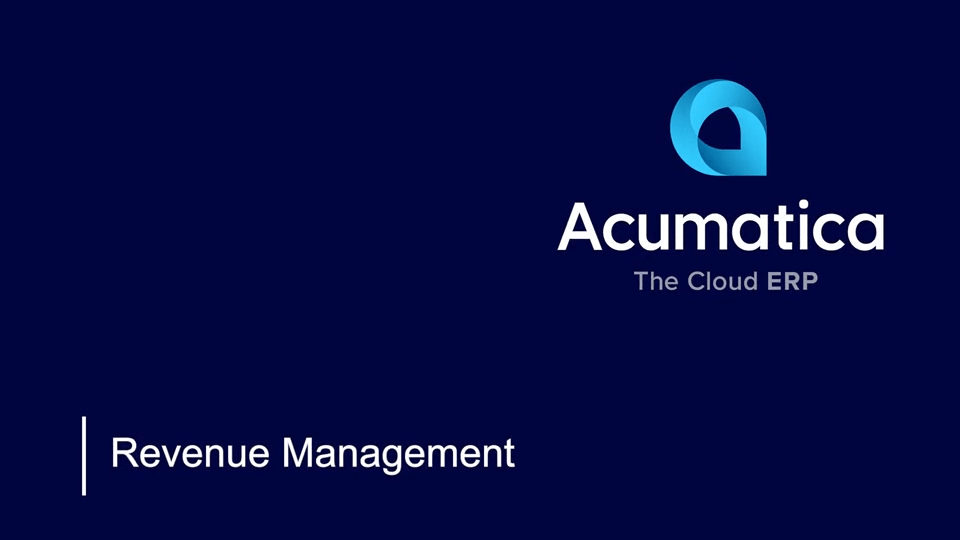Accounts receivable software helps you track all the money your company is owed but has not collected yet. This includes invoices you’ve sent for products or services you’ve already delivered.
Accounts Receivable
How Accounts Receivable Software Can Work for You
Accounts receivable is the business function that deals with tracking and collecting all the money your company is owed. Ever sold a product or provided a service for which you weren’t paid in full at the time of the transaction? That’s accounts receivable.
Acumatica Accounts Receivable Software helps you generate invoices, send statements, collect and apply payments, verify balances, track commissions, and deliver customer reports. This accounts receivable solution is fully integrated with all other Acumatica modules.
Key Benefits of Accounts Receivable Software for Your Company
-
Get More Options for Statements and Invoices
Improve control of the creation and delivery of customer invoices and statements. Format statements for printing, HTML, or PDF delivery. Include company information and messages on customer-facing statements, generate statements on-demand, and withhold printing of statements that contain no detail.
-
Take Credit Card Payments
Accept PCI-compliant credit card payments, manual charges, transaction voids, and refunds. View transactions and issue warnings for expiring cards. Connect to bank processing centers. Expand credit card processing options by integrating with Fortis Credit Card Processing Center. Improve profitability by transmitting level 3 data on commercial credit card payments resulting in lower interchange rates.
-
Meet Your Revenue Recognition Requirements
Use deferred revenue codes for individual line items at invoicing to support your revenue recognition requirements. Acumatica will recognize the current part of deferred revenue and generate the appropriate transactions.
-
Manage Credit Control by Parent Accounts
Companies with franchises or multiple branches can configure parent-child relationships in the Acumatica accounts receivable software among the customer accounts that represent these companies. This feature enables you to manage credit control at the parent account level. This includes credit verification rules, consolidated dunning letters, and AR reports that include consolidated data.
Important Features of Accounts Receivable
Create contract templates to apply and manage recurring monthly fees, setup fees, renewal fees, consumption-based fees, overage charges, and minimum charge amounts. Specify start and end dates, renewal terms, a billing schedule, and line items. Contracts are linked to case management and employee time sheets to include billable hours and customer support hours in bills.
Map groups of customers to different AR accounts in the GL. Override default AR accounts during document entry. Acumatica accounts receivable software tracks account assignments and applies correct offsets and amounts whenever a payment is applied.
Issue invoices and collect payments in any currency. Acumatica accounts receivable software maintains customer balances in the foreign currency as well as the base currency. Automatic currency translations provide real-time adjustments based on the current rate, complete currency triangulation on payment, compute realized gain or loss, and compute unrealized gain or loss for open items. Support multiple base currencies and consolidates reporting across companies with different base currencies.
Manage tax exemption certificates, automatically calculate sales and VAT taxes on standard and prepayment invoices, and prepare tax filing reports. Customer default tax zones can be overridden during document entry. Supports multiple tax items per document line, deduction of tax amount from the price, and tax on tax calculation.
Automatically enforce credit limits at order entry, and invoicing. Customer Configuration options can block invoice processing or issue warnings. Create Dunning Letters for past-due accounts and include all related documents and fees and customize messages, attachments, and fees. Temporarily increase credit limits.
Apply partial or full refunds to payments, pre-payments, and credit memos. Track and report balances by customer.
Automatically apply payments to the oldest outstanding documents. Easily void incorrect payment applications – all affected balances will be automatically reversed.
Display an AR Aging by Project Report by project rather than by customer to reduce days sales outstanding (DSOs) and improve payment efficiency.
Automatically calculate sales commissions. Commissions can be split among multiple salespeople, linked to specific line items on an invoice, and paid when the invoice is issued or when the payment is received. Commissions can be calculated on a monthly, quarterly, or annual basis.
Automatically calculate and apply overdue charges. Compute overdue charges as a percentage or as a minimum charge amount. Write off overdue charges in full or partial when processing a customer refund.
Acumatica lets you write off small document balances. You can control write-offs using a maximum write-off limit and eligible customers list.
Record revenue and expenses when payments are received or disbursed rather than when the transactions occur.
Acumatica provides a complete audit trail of all transactions. Transaction records cannot be deleted or cancelled. Errors are corrected through reversing entries that are likewise documented. The system tracks the ID of the user who entered the transaction and the user who modified the record. Notes and supporting electronic documents are attached directly to transactions in the accounts receivable solution.
Specify which individuals and roles can view and modify customer account information and balances. Improve accuracy and prevent errors by validating dates on financial forms, processes, and projects and rejecting dates that do not correspond to any financial period in the master calendar.
Acumatica accounts receivable software supports PCI DSS-compliant integration with Authorize.Net. Sensitive credit card information is never stored in the Acumatica ERP database. Instead, the system sends customer credit card details to the processing center through an encrypted channel.
Activate or deactivate POS terminals, accept payments from POS terminals, track the status of transactions and update POS payments in the system, resend a transaction to the POS terminal, Authorize and void a POS transaction, and Issue full or partial refunds as needed.
Enhance compliance and data accuracy with improved machine learning anomaly detection to identify data irregularities and promote effective business decisions. Quickly isolate records that deviate from normal data patterns in sales order margins.
 Canada (English)
Canada (English)
 Columbia
Columbia
 Caribbean and Puerto Rico
Caribbean and Puerto Rico
 Ecuador
Ecuador
 India
India
 Indonesia
Indonesia
 Ireland
Ireland
 Malasya
Malasya
 Mexico
Mexico
 Panama
Panama
 Peru
Peru
 Philippines
Philippines
 Singapore
Singapore
 South Africa
South Africa
 Sri-Lanka
Sri-Lanka
 Thailand
Thailand
 United Kingdom
United Kingdom
 United States
United States




